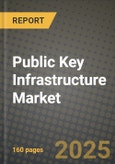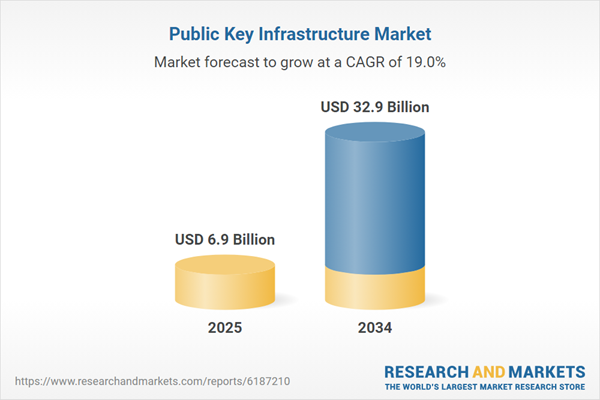Public Key Infrastructure Market Overview
The Public Key Infrastructure (PKI) market is a foundational pillar of modern digital security, enabling secure communication, authentication, and data integrity through the use of cryptographic keys and digital certificates. PKI systems support a wide range of applications, including secure email, encrypted transactions, identity management, IoT device authentication, and digital signatures. As enterprises and governments increasingly digitize their operations, the demand for robust and scalable PKI solutions has surged. The rise in cyber threats, remote workforces, and cloud adoption has further emphasized the need for trusted identity verification and end-to-end encryption. PKI solutions are now integral in sectors like banking, healthcare, defense, and e-commerce where data privacy and regulatory compliance are non-negotiable. With expanding use cases and tighter security mandates, the PKI market continues to evolve, offering automation, cloud-based certificate lifecycle management, and integration with modern IT infrastructures.The PKI market experienced accelerated growth as enterprises addressed growing cybersecurity risks and compliance pressures. Organizations increasingly adopted cloud-based PKI platforms for easier deployment, management, and scalability. Automation of certificate lifecycle management (CLM) became a key focus to mitigate human error and prevent outages due to expired certificates. Industries regulated under standards like HIPAA, GDPR, and PCI-DSS expanded their PKI investments to meet audit and security requirements. Major tech vendors introduced PKI-as-a-Service (PKIaaS) offerings tailored for hybrid and multi-cloud environments. Additionally, PKI use cases extended into DevOps pipelines and CI/CD workflows to secure machine identities and code signing. Integration with zero-trust frameworks and identity and access management (IAM) platforms strengthened PKI’s role in enterprise-wide security strategies. Meanwhile, governments increased their investments in national e-ID systems and smart infrastructures, creating new opportunities for certificate authorities and trusted service providers.
The PKI market is expected to become more dynamic, with a strong focus on quantum-safe cryptography, interoperability, and AI-powered automation. As quantum computing advances, enterprises will begin piloting post-quantum cryptography (PQC) solutions to future-proof their PKI frameworks. The demand for machine identity management will surge, particularly with the proliferation of IoT, 5G, and autonomous systems requiring device-to-device trust. Cloud-native PKI platforms will offer greater integration with security orchestration, endpoint protection, and threat detection tools. Regulatory frameworks are expected to introduce more stringent certificate validation, transparency logs, and incident reporting standards, elevating the role of PKI in governance. Additionally, partnerships between cybersecurity firms and public sector agencies will enhance the trust ecosystem across digital borders. The market will grow not just in volume but in complexity, requiring vendors to offer highly adaptable, scalable, and compliant solutions to stay ahead of rapidly evolving digital risks.
Key Insights: Public Key Infrastructure Market
- Cloud-based PKI and PKI-as-a-Service (PKIaaS) offerings are gaining traction for their scalability, reduced overhead, and easy integration with modern IT environments.
- Automation of certificate lifecycle management is becoming essential to prevent outages, manage expiration, and reduce manual errors in large organizations.
- Integration of PKI with zero-trust security models and identity management solutions is enhancing visibility and secure access across enterprise networks.
- Post-quantum cryptography (PQC) adoption is beginning to shape the next wave of PKI innovation in anticipation of future quantum computing threats.
- PKI use cases are expanding beyond user authentication to secure DevOps, machine identities, IoT ecosystems, and containerized applications.
- Growing cyber threats and the need for secure identity verification are driving adoption of PKI across both public and private sectors.
- Increasing regulatory and compliance requirements are pushing organizations to deploy robust PKI solutions to protect sensitive data and communications.
- Expansion of cloud computing, mobile workforces, and connected devices is fueling demand for scalable, centralized certificate management platforms.
- Digital transformation initiatives in critical infrastructure and government sectors are creating demand for secure digital identity and trust mechanisms.
- The complexity of managing PKI across diverse environments, combined with skill shortages and evolving encryption standards, poses a challenge to seamless implementation and long-term scalability.
Public Key Infrastructure Market Segmentation
By Component
- Hardware Module
- Solution
- Services
By Deployment Mode
- Cloud
- On-Premise
By Organization Size
- Large Enterprises
- Small and Medium Enterprise (SME)
By Vertical
- BFSI
- Government and Defense
- IT and Telecom
- Retail
- Healthcare
- Manufacturing
- Other Verticals
Key Companies Analysed
- EcoWater Systems LLC
- Kinetico Incorporated
- Hydroflux Pty Ltd.
- Envicare Technologies Pvt. Ltd.
- Wychwood Water Systems Ltd.
- Harvey Water Softeners Ltd.
- Pelican Water Systems
- BWT AG
- Marlo Incorporated
- Monarch Water Ltd.
- Watts Water Technologies Inc.
- Feedwater Limited
- Qingdao Haier Co. Ltd.
- Dwater Limited
- Culligan International Company
- Water-Right Inc.
- Canature Environmental Products Co. Ltd.
- A.O. Smith Corporation
- 3M Company
- General Electric Company
- Whirlpool Corporation
- COWAY Co. Ltd.
- LG Electronics Inc.
- Panasonic Corporation
- Samsung Electronics Co. Ltd.
- Unilever N.V.
- Procter & Gamble Co.
- Kao Corporation
- Colgate-Palmolive Company
- Church & Dwight Co. Inc.
- Henkel AG & Co. KGaA
- Reckitt Benckiser Group plc
- Clorox Company
- Ecolab Inc.
- Dow Chemical Company
- BASF SE
- Solvay SA
- Akzo Nobel N.V.
Public Key Infrastructure Market Analytics
The report employs rigorous tools, including Porter’s Five Forces, value chain mapping, and scenario-based modeling, to assess supply-demand dynamics. Cross-sector influences from parent, derived, and substitute markets are evaluated to identify risks and opportunities. Trade and pricing analytics provide an up-to-date view of international flows, including leading exporters, importers, and regional price trends.
Macroeconomic indicators, policy frameworks such as carbon pricing and energy security strategies, and evolving consumer behavior are considered in forecasting scenarios. Recent deal flows, partnerships, and technology innovations are incorporated to assess their impact on future market performance.Public Key Infrastructure Market Competitive Intelligence
The competitive landscape is mapped through proprietary frameworks, profiling leading companies with details on business models, product portfolios, financial performance, and strategic initiatives. Key developments such as mergers & acquisitions, technology collaborations, investment inflows, and regional expansions are analyzed for their competitive impact. The report also identifies emerging players and innovative startups contributing to market disruption.
Regional insights highlight the most promising investment destinations, regulatory landscapes, and evolving partnerships across energy and industrial corridors.Countries Covered
- North America - Public Key Infrastructure market data and outlook to 2034
- United States
- Canada
- Mexico
- Europe - Public Key Infrastructure market data and outlook to 2034
- Germany
- United Kingdom
- France
- Italy
- Spain
- BeNeLux
- Russia
- Sweden
- Asia-Pacific - Public Key Infrastructure market data and outlook to 2034
- China
- Japan
- India
- South Korea
- Australia
- Indonesia
- Malaysia
- Vietnam
- Middle East and Africa - Public Key Infrastructure market data and outlook to 2034
- Saudi Arabia
- South Africa
- Iran
- UAE
- Egypt
- South and Central America - Public Key Infrastructure market data and outlook to 2034
- Brazil
- Argentina
- Chile
- Peru
Research Methodology
This study combines primary inputs from industry experts across the Public Key Infrastructure value chain with secondary data from associations, government publications, trade databases, and company disclosures. Proprietary modeling techniques, including data triangulation, statistical correlation, and scenario planning, are applied to deliver reliable market sizing and forecasting.Key Questions Addressed
- What is the current and forecast market size of the Public Key Infrastructure industry at global, regional, and country levels?
- Which types, applications, and technologies present the highest growth potential?
- How are supply chains adapting to geopolitical and economic shocks?
- What role do policy frameworks, trade flows, and sustainability targets play in shaping demand?
- Who are the leading players, and how are their strategies evolving in the face of global uncertainty?
- Which regional “hotspots” and customer segments will outpace the market, and what go-to-market and partnership models best support entry and expansion?
- Where are the most investable opportunities - across technology roadmaps, sustainability-linked innovation, and M&A - and what is the best segment to invest over the next 3-5 years?
Your Key Takeaways from the Public Key Infrastructure Market Report
- Global Public Key Infrastructure market size and growth projections (CAGR), 2024-2034
- Impact of Russia-Ukraine, Israel-Palestine, and Hamas conflicts on Public Key Infrastructure trade, costs, and supply chains
- Public Key Infrastructure market size, share, and outlook across 5 regions and 27 countries, 2023-2034
- Public Key Infrastructure market size, CAGR, and market share of key products, applications, and end-user verticals, 2023-2034
- Short- and long-term Public Key Infrastructure market trends, drivers, restraints, and opportunities
- Porter’s Five Forces analysis, technological developments, and Public Key Infrastructure supply chain analysis
- Public Key Infrastructure trade analysis, Public Key Infrastructure market price analysis, and Public Key Infrastructure supply/demand dynamics
- Profiles of 5 leading companies - overview, key strategies, financials, and products
- Latest Public Key Infrastructure market news and developments
Additional Support
With the purchase of this report, you will receive:- An updated PDF report and an MS Excel data workbook containing all market tables and figures for easy analysis.
- 7-day post-sale analyst support for clarifications and in-scope supplementary data, ensuring the deliverable aligns precisely with your requirements.
- Complimentary report update to incorporate the latest available data and the impact of recent market developments.
This product will be delivered within 1-3 business days.
Table of Contents
Companies Mentioned
- EcoWater Systems LLC
- Kinetico Incorporated
- Hydroflux Pty Ltd.
- Envicare Technologies Pvt. Ltd.
- Wychwood Water Systems Ltd.
- Harvey Water Softeners Ltd.
- Pelican Water Systems
- BWT AG
- Marlo Incorporated
- Monarch Water Ltd.
- Watts Water Technologies Inc.
- Feedwater Limited
- Qingdao Haier Co. Ltd.
- Dwater Limited
- Culligan International Company
- Water-Right Inc.
- Canature Environmental Products Co. Ltd.
- A.O. Smith Corporation
- 3M Company
- General Electric Company
- Whirlpool Corporation
- COWAY Co. Ltd.
- LG Electronics Inc.
- Panasonic Corporation
- Samsung Electronics Co. Ltd.
- Unilever N.V.
- Procter & Gamble Co.
- Kao Corporation
- Colgate-Palmolive Company
- Church & Dwight Co. Inc.
- Henkel AG & Co. KGaA
- Reckitt Benckiser Group PLC
- Clorox Company
- Ecolab Inc.
- Dow Chemical Company
- BASF SE
- Solvay SA
- Akzo Nobel N.V.
Table Information
| Report Attribute | Details |
|---|---|
| No. of Pages | 160 |
| Published | October 2025 |
| Forecast Period | 2025 - 2034 |
| Estimated Market Value ( USD | $ 6.9 Billion |
| Forecasted Market Value ( USD | $ 32.9 Billion |
| Compound Annual Growth Rate | 18.9% |
| Regions Covered | Global |
| No. of Companies Mentioned | 38 |









